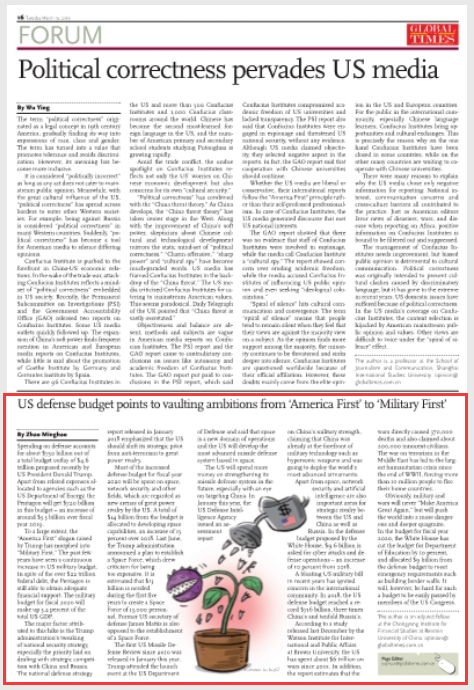Major Power Relations
Your Present Location: PROGRAMS> Major Power RelationsZhao Minghao: US defense budget points to vaulting ambitions from ‘America First’ to ‘Military First’
By Zhao Minghao Source: Global Times Published: 2019-3-18
Spending on defense accounts for about $750 billion out of a total budget outlay of $4.6 trillion proposed recently by US President Donald Trump. Apart from related expenses allocated to agencies such as the US Department of Energy, the Pentagon will get $720 billion in this budget - an increase of around $3.3 billion over fiscal year 2019.

To a large extent, the "America First" slogan raised by Trump has morphed into "Military First." The past few years have seen a continuous increase in US military budget. In spite of the over $22 trillion federal debt, the Pentagon is still able to obtain adequate financial support. The military budget for fiscal 2020 will make up 3.2 percent of the total US GDP.
The major factor attributed to this hike is the Trump administration's tweaking of national security strategy, especially the priority laid on dealing with strategic competition with China and Russia. The national defense strategy report released in January 2018 emphasized that the US should shift its strategic pivot from anti-terrorism to great power rivalry.
Most of the increased defense budget for fiscal year 2020 will be spent on space, network security and other fields, which are regarded as new arenas of great power rivalry by the US. A total of $14 billion from the budget is allocated to developing space capabilities, an increase of 15 percent over 2018. Last June, the Trump administration announced a plan to establish a Space Force, which drew criticism for being too expensive. It is estimated that $13 billion is needed during the first five years to create a Space Force of 13,000 personnel. Former US secretary of defense James Mattis is also opposed to the establishment of a Space Force.
The first US Missile Defense Review since 2010 was released in January this year. Trump attended the launch event at the US Department of Defense and said that space is a new domain of operations and the US will develop the most advanced missile defense system based in space.
The US will spend more money on strengthening its missile defense system in the future, especially with an eye on targeting China. In January this year, the US Defense Intelligence Agency issued an assessment report on China's military strength, claiming that China was already at the forefront of military technology such as hypersonic weapons and was going to deploy the world's most advanced armaments.
Apart from space, network security and artificial intelligence are also important areas for strategic rivalry between the US and China as well as Russia. In the defense budget proposed by the White House, $9.6 billion is asked for cyber attacks and defense operations - an increase of 10 percent from 2018.
A bloating US military bill in recent years has ignited concern in the international community. In 2018, the US defense budget reached a record $716 billion, three times China's and tenfold Russia's.
According to a study released last December by the Watson Institute for International and Public Affairs at Brown University, the US has spent about $6 trillion on wars since 2001. In addition, the report estimates that the wars directly caused 370,000 deaths and also claimed about 200,000 innocent civilians. The war on terrorism in the Middle East has led to the largest humanitarian crisis since the end of WWII, forcing more than 10 million people to flee their home countries.
Obviously, military and wars will never "Make America Great Again," but will push the world into a more dangerous and deeper quagmire. In the budget for fiscal year 2020, the White House has cut the budget for Department of Education by 10 percent, and allocated $9 billion from the defense budget to meet emergency requirements such as building border walls. It will, however, be hard for such a budget to be easily passed by members of the US Congress.
The author is a visiting fellow at the Chongyang Institute for Financial Studies at Renmin University of China.























































































 京公网安备 11010802037854号
京公网安备 11010802037854号





